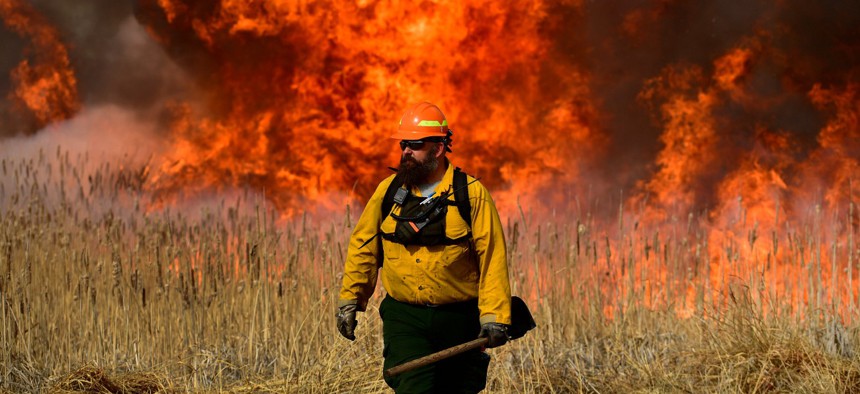
U.S. Fish and Wildfire firefighter Joe Murphy keeps an eye on the fire during a prescribed burn at the Rocky Mountain Arsenal National Wildlife Refuge on April 5, 2021 in Denver. Some federal agencies say they are struggling to compete with state and local governments to hire firefighters. Helen H. Richardson/MediaNews Group/The Denver Post via Getty Images
Firefighters Union Calls for Higher Pay Amid Staffing Shortage
A Senate committee also advanced legislation this week that would make it easier for federal firefighters to qualify for workers compensation benefits in connection with chronic conditions associated with firefighting.
A union that represents federal firefighters urged the Biden administration on Thursday to interpret language in the bipartisan infrastructure law that authorizes increased pay for wildland firefighters as broadly as possible, amid a staffing shortage at the start of the annual wildfire season.
Earlier this month, officials at the U.S. Forest Service testified before Congress that their agency is only about halfway to their staffing targets in some regions, and that they have struggled to compete with state and local governments to hire firefighters. That news comes despite the fact that President Biden signed an executive order last year increasing federal firefighters’ pay to $15 per hour, and Congress providing $5.5 billion to the Forest Service in the Infrastructure Investment and Jobs Act, of which $1 billion has been set aside for firefighter salaries.
The infrastructure law also authorizes agencies to increase the base salary of federal wildland firefighters by $20,000 per year or 50% of their current base salary, whichever is lower, provided that the firefighter is “located within a specified geographic area in which it is difficult to recruit or retain a federal wildland firefighter.” Given the agency’s staffing shortage, National Federation of Federal Employees National President Randy Erwin said in a statement Thursday that the administration should grant this pay increase nationwide.
“I do not think folks are aware of just how serious the wildland firefighter staffing issues is in this country,” he said. “Federal firefighters are so woefully underpaid that agencies are unable to hire and retain the staff they need to operate. All indications are that the United States is going to face a very difficult fire season, and right now, fire agencies are simply not going to have the personnel they need to contend with it.”
Erwin said that if the administration authorizes such sizeable pay raises in only a few regions where it’s difficult to recruit, it would create an unfair dichotomy among the workforce, and could spur an exodus to state and local fire agencies.
“It is absolutely imperative that the Biden administration get this right—that means implementing the wildland firefighter pay increase right away and nationwide,” he said. “[If] this administration chooses a path that involves significant raises for some wildland firefighters, but not others, it will be met with outrage from those—the local few who did not seek employment elsewhere—drawing the short end of the stick. Recruitment and retention will go from difficult to impossible.”
Workers Compensation Bill Advances in Senate
Bipartisan legislation aimed at making it easier for federal firefighters to claim federal disability benefits in connection with a number of chronic health conditions associated with exposure to smoke and other hazardous materials associated with firefighting advanced Wednesday in a Senate committee.
The Senate Homeland Security and Governmental Affairs Committee recommended by voice vote that the Federal Firefighter Fairness Act (S. 1116), introduced by Sen. Tom Carper, D-Del., move to the chamber’s floor for a final vote. On the Republican side, the bill is sponsored by Sens. Susan Collins, R-Maine, and Deb Fischer, R-Neb.
The bill creates a presumption that a variety of chronic lung and heart conditions and cancers were caused due to on-the-job exposures for federal firefighters applying for federal workers compensation benefits. Currently, wildland firefighters struggle to qualify for those benefits because of the difficulty in providing evidence that pinpoints which incident might have caused their condition.
Similar legislation, introduced by Rep. Salud Carbajal, D-Calif., passed out of the House by a 288-131 vote earlier this month. With bipartisan support in the Senate, it is likely to become law.
NEXT STORY: Life Insurance for Retirees





